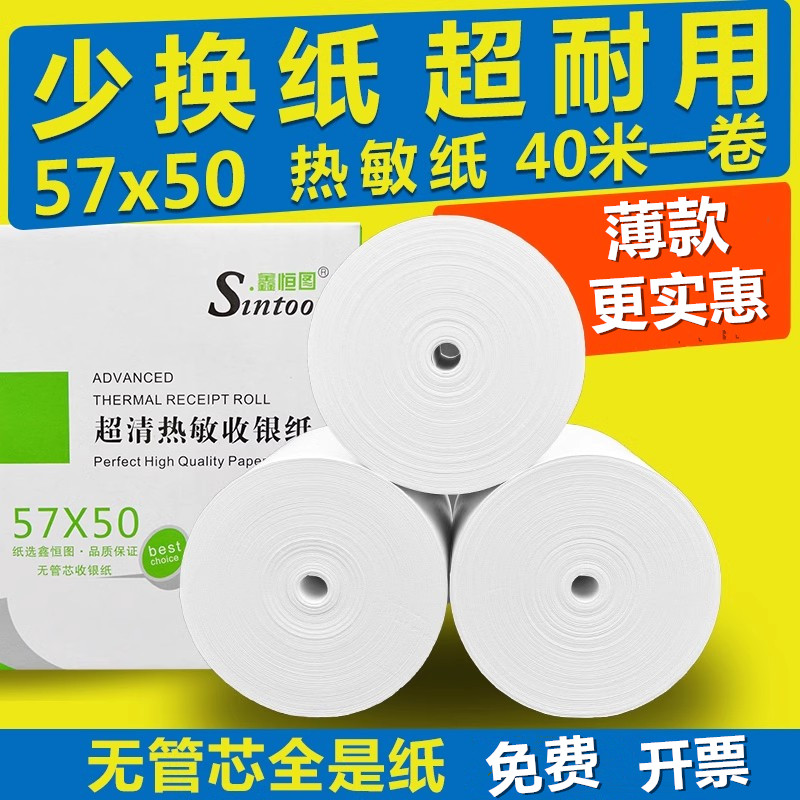收银纸:办公耗材中的关键角色
尕枯非生
2024-11-06 09:00:54
0次
收银纸:办公耗材中的关键角色
在现代化的办公环境中,办公耗材起着至关重要的作用,其中收银纸无疑是其中的关键角色。作为一种常见的打印媒介,收银纸广泛应用于各类商业场景,特别是零售和餐饮行业,它承载着记录交易信息、提供凭证以及提升工作效率的重要使命。
一、收银纸的重要性
收银纸在商业交易中扮演着不可或缺的角色。它不仅是商品交易的重要凭证,也是商家与消费者之间沟通的桥梁。通过收银纸,商家能够快速准确地记录每一笔交易的信息,包括商品名称、价格、数量以及交易时间等,为后续的财务管理和数据分析提供有力支持。
二、收银纸在办公耗材中的地位
在办公耗材的大家族中,收银纸因其独特的用途和广泛的应用场景,占据了举足轻重的地位。办公耗材包括纸张、墨粉、色带等,而收银纸作为其中的一种,因其特殊的材质和适用性,被广泛应用于各类商业场景。无论是大型超市、百货商场,还是小型便利店、餐饮店,都需要使用收银纸来记录交易信息,提高工作效率。
三、收银纸的特性和应用
收银纸具有较高的打印质量、良好的防伪性能和环保特性。它能够清晰地呈现交易信息,方便消费者核对和保存。同时,收银纸还具有较高的防伪性能,能够有效防止假钞和非法交易的发生。此外,现代收银纸还注重环保特性,采用可回收、无污染的材质,以降低对环境的影响。
英文翻译:
Cash register paper: A Key Role in Office Consumables
In a modern office environment, office consumables play a crucial role, among which cash register paper is undoubtedly a key player. As a common printing medium, cash register paper is widely used in various business scenarios, especially in retail and catering industries. It bears the important mission of recording transaction information, providing vouchers, and improving work efficiency.
I. Importance of Cash Register Paper Cash register paper plays an indispensable role in commercial transactions. It is not only an important voucher for commodity transactions, but also a bridge of communication between businesses and consumers. Through cash register paper, businesses can quickly and accurately record the information of each transaction, including product names, prices, quantities, and transaction times, providing strong support for subsequent financial management and data analysis.II. Status of Cash Register Paper in Office Consumables
In the large family of office consumables, cash register paper occupies a pivotal position due to its unique purpose and wide application. Office consumables include paper, ink powder, ribbon, etc., and cash register paper, as one of them, is widely used in various commercial scenarios due to its special material and applicability. Whether it is a large supermarket, a shopping mall, or a small convenience store and catering business, cash register paper is needed to record transaction information and improve work efficiency. III. Characteristics and Applications of Cash Register Paper Cash register paper has high printing quality, good anti-counterfeiting performance, and environmental protection characteristics. It can clearly present transaction information, which is convenient for consumers to check and save. At the same time, cash register paper also has good anti-counterfeiting performance, which can effectively prevent the occurrence of counterfeit money and illegal transactions. In addition, modern cash register paper also focuses on environmental protection characteristics, using recyclable and non-polluting materials to reduce the impact on the environment.相关内容
热门资讯
收银纸的保存与使用小技巧,你g...
本文介绍了收银纸的保存与使用小技巧,包括存放环境、分类整理、避免重叠、防尘防污等,以及正确安装、调整...
办公必备:如何选择合适的收银纸
选择合适收银纸需了解种类、考虑质量与价格因素,参考用户评价与口碑。热敏纸、铜版纸和喷墨纸等不同类型各...
"办公耗材新宠:环保型收银纸的...
环保型收银纸因其环保、保存时间长、打印清晰等优势备受青睐。选择时需考虑打印机型号、纸张质量和价格等因...
办公耗材大揭秘:收银纸的优缺点...
本文探讨了收银纸的优缺点,包括便捷高效、成本低廉、环保可持续等优点,以及保存性差、印刷限制和安全风险...
提升收银效率:高质量收银纸的选...
本文介绍了提升收银效率的关键因素——高质量收银纸的选购指南。选购时需关注纸张质量、适用性、环保性和价...
精细化管理:办公耗材中收银纸的...
本文讨论了办公耗材中收银纸的精细化管理,包括合理规划存储空间、标识明确分类存储、定期检查维护、设定合...
办公成本节约小贴士:如何选择经...
为了节约办公成本,选择经济实惠的收银纸很重要。理解收银纸类型和质量,考虑长期使用成本,选择合适尺寸,...
走进绿色办公:可循环使用的收银...
本文介绍可循环使用的绿色收银纸的特性与优点,如环保、耐用、成本低等,并分享了如何选择适合企业需求的绿...
打印机好伙伴:收银纸的多样性与...
本文探讨了收银纸的多样性和应用场景,包括其在零售、餐饮、医疗和物流等行业的广泛应用。收银纸具有多种类...
了解收银纸:种类、用途及优缺点...
本文介绍了收银纸的种类、用途及优缺点分析。收银纸是POS系统中常用的耗材,具有方便使用、适应性强、价...



